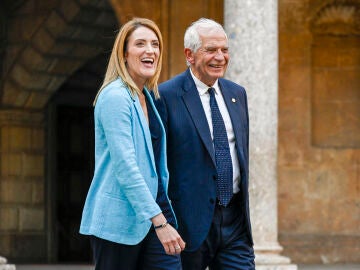
The leaders of the Twenty-seven meet this Friday in Granada to debate key issues for the future of the EU, among them enlargement, the immigration problem and strategic autonomy. After the third meeting of the European Political Community was held the day before, which includes the EU countries and the majority of Europeans who are not part of that group, the heads of State and Government of the community club met to advance their reflection on the joint challenges that lie ahead.
This is an informal summit, therefore it does not have decision-making capacity on the issues that are going to be addressed, but the signing of a declaration on them is expected.
The acting President of the Government, Pedro Sánchez, will act as host again as Spain holds the semi-annual presidency of the Council of the EU and hopes that Granada will be a turning point in the decisions that the EU will have to make later in the face of the issues that will be present in the conversations.
The extension It is one of them, and although nothing concrete is expected in this regard, there is hope that a momentum will take shape so that the aspiration of several countries to join the EU becomes a reality. Among those countries is Ukraine, which the European Union and Spain continue to support in the face of Russian aggression and hope that it will become another partner in the future. But to do this they emphasize that both Ukraine and the rest of the candidates must meet all the requirements and make the reforms that are required of them.
According to the migrationthe summit comes after an agreement will be reached on Wednesday agreement on the Crisis Regulation, the last piece of the European Pact on Migration and Asylum that remained to fit together. However, Poland and Hungary opposed that pact and Austria, the Czech Republic and Slovakia abstained, which may complicate the final path that remains for the pact in even the discussions that may take place this Friday between the leaders in Granada.
Another key issue of the meeting will be the strategic autonomy of the EU, and Spain will present at this summit the proposal that it has been preparing in this regard with the collaboration of the rest of the countries. A proposal based on reindustrialize the EU, strengthen leadership in strategic sectors such as energy or healthcare and focus on goods and services in which Europe is already competitive such as artificial intelligence, wind turbines or organic fertilizers.
Spain’s objective is not to replace the goods, services and raw materials that are currently imported from third countries, but to look for innovative and sustainable alternatives, from renewables to quantum computers, and to this end he defended reaching the 3% investment threshold in research and development. After the summit there will be an appearance by Sánchez together with the president of the European Council, Charles Michel; and the president of the Commission, Ursula von der Leyen, to report on the development of the meeting.
Source: Lasexta
Ricardo is a renowned author and journalist, known for his exceptional writing on top-news stories. He currently works as a writer at the 247 News Agency, where he is known for his ability to deliver breaking news and insightful analysis on the most pressing issues of the day.












